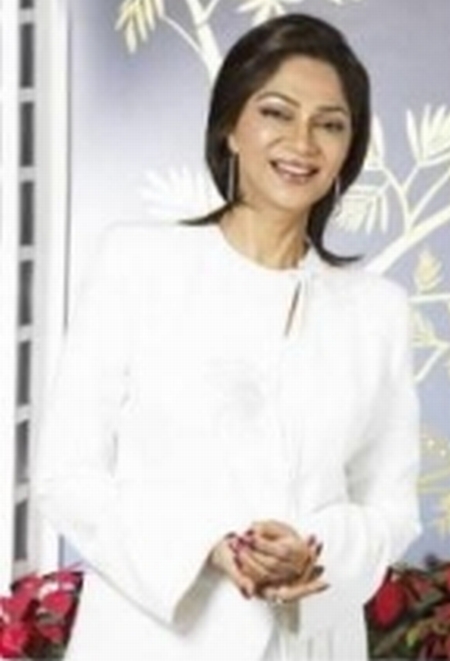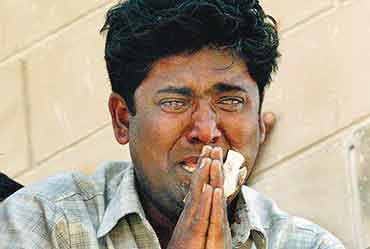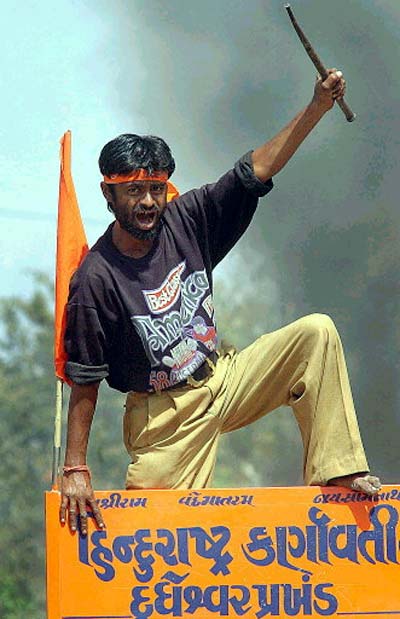The politically indifferent elite class has finally woken up after 26/11. Not a day passes without some celebrities adding their bit to our patriotic passion. The middle class which normally stayed away from the political scene also reacted spontaneously. This is a welcome change and we all should be happy about it.

Unfortunately the Mumbai riots of 1992-93 and the much worse pogrom of 2002 in Gujarat targeting a particular community (official death toll around 1000) didn’t evoke such a universal and sustained uproar to punish the perpetrators.

As a matter of fact, it is incorrect to call it Gujarat “riots”. Calling it a riot would be euphemistic. It included serious sexual crimes against women and children. Women were paraded naked and raped. Some gang raped and then burnt alive. Some were just girls as young as 12. Others were pregnant women. The rapists in many cases were neighbors the women knew. There was one case of a pregnant woman raped and fetus ripped out of her abdomen and thrown into the fire. The intensity, magnitude and duration of the pogrom was deadly because of State complicity.

What would we call such crimes? Can we merely dub them as “riots”? To me it seems no less than terrorism. It was indeed genocide. A fundamental ethnic cleansing. If you want to know more about it, you should read the book Gujarat: The Making of a Tragedy by Siddharth Varadarajan.
Many say we shouldn’t forget the Mumbai terror attacks. Of course we shouldn’t! It is and will be a terrible chapter in Mumbai’s history. But can we or should we forget Gujarat? As of now, it seems that we already have.
The elite class which vociferously seeks justice for Mumbai terror victims were largely silent observers during and after the Gujarat carnage. Human rights groups like NHRC, PUCL, CJP a few intellectuals, anti-communal groups and prominent citizens raised their voices. However, the majority of the elite class was largely silent. There were no candle light meetings at street corners, no extensive TV coverage or radio interviews of Gujarat victims. Those killed in Gujarat, some of them after being sexually humiliated and raped were Indian citizens. They had a right to live. They had committed no crime! It was the State’s duty to protect them. The State failed. Not just that. The people in power in a malafide manner tried to prevent justice. The actions of the Gujarat Government and the events that unfolded later indicate this.
It’s true that some criminals in Gujarat are now in jail. However, getting so far not easy. It happened after a great struggle and many interventions by the Supreme Court and transfer of cases from Gujarat High Court to Bombay High Court. Normally such cases should be tried and criminals punished without a need for special intervention. The NHRC, PUCL a small part of the media (esp. Tehelka) had to repeatedly keep this subject alive in the public memory.
The way the Gujarat riots cases have been handled is a monumental example of the justice system gone wrong in India. The Chief Justice of the Supreme Court remarked “I have no faith left in the prosecution and the Gujarat government. I am not saying Article 356. You have to protect people and punish the guilty. What else is raj dharma? You quit if you cannot prosecute the guilty,”
Now sixteen years later, can we say that justice has been done for the Gujarat victims? No, the saga continues as many of the rapists, murderers and police personnel responsible for Gujarat are still roaming free. Particularly those in positions of power who conspired the event.
What happens when the State colludes with criminals committing genocide and later works hard to scuttle justice? It emboldens criminals to repeat such atrocities as they know they will not be punished. Hence punishment is a MUST if we are serious about weeding out such crimes. Also if this goes unpunished, it creates a fertile breeding ground for hatred and distrust between communities. If the State fails to punish, the people must remember the crimes and keeping raising it to the conscious level till the punishment is meted out. Even if it takes decades.
Whenever anyone speaks about punishing such crimes, we hear voices from vested interests saying, we should allow old wounds to heal. We should not rake up old issues. Old wounds will heal faster and better when we are sincere about providing justice. Reconciliation can happen if we feel and express solidarity with the victims. The first step towards this will be to prosecute and punish the criminals. Whoever they may be. Howsoever high and mighty.
This article in no way intends to reduce the importance of the dastardly attack on Mumbai. Or is it an attempt to equate the two events. Both were seriously traumatic. But they were different. We need to be serious about both.
The true administration of justice is the firmest pillar of good government



